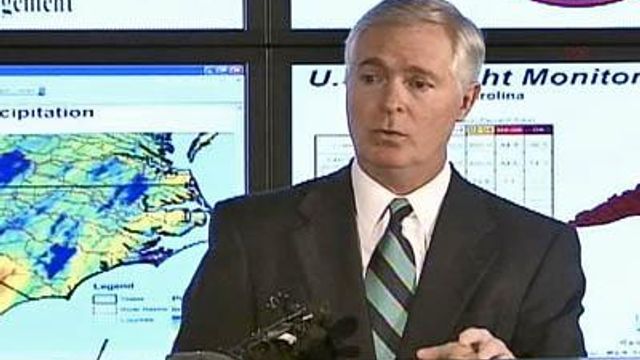State Emergency Team Activated for Drought
State officials have activated an emergency response team to oversee how the state deals with the ongoing drought.
Posted — UpdatedThe State Emergency Response Team usually is called to action to handle preparations for and response to natural disasters like hurricanes or winter storms. But Bryan Beatty, secretary of the state Department of Crime Control and Public Safety, said Tuesday that his office has assumed responsibility for coordinating the drought response effort.
Various state departments will continually assess the drought's impact on North Carolina's economy, health, agriculture industry and energy and water resources, and targeted actions will be taken as needed, Beatty said.
Gov. Mike Easley reiterated his call for statewide conservation, noting that state government water consumption has dropped by 31 percent in the past two months.
"It's easier than we realize to do it, if we just think about it," Easley said at a news conference. "It's just a matter of adjusting those habits."
In the first of three regional meetings to devise ways to battle the drought – the others will be held Thursday in Greensboro and Nov. 8 in Asheville – state climate experts said conditions North Carolina is experiencing usually occur only once or twice in a century. The officials said impacts from the statewide drought would likely become worse next year.
Rains last week helped replenish depleted reservoirs, but many lakes remained well below normal levels. Meteorologists also have forecast a drier-than-normal winter across the Southeast.
"It's difficult to sustain a community that doesn't have a water supply. You can't do that," said Bill Ross, secretary of the state Department of Environment and Natural Resources.
Falls Lake, for example, rose about 8 inches but is still more than 7 feet below normal. The lake, which supplies water to Raleigh and several Wake County towns, leaves residents with 111 days of quality drinking water if the region doesn't see any rain in the next three months.
Lake Michie, one of Durham's water supplies, and Jordan Lake, which supplies Cary and Chatham County, both rose a couple of feet but remain several feet below normal. Rocky Mount's Tar River Reservoir was 15 feet below normal before the rain but made up about 13 feet of the deficit.
Climatologists said the state needs 20 to 30 inches of rain over the next six months to erase the drought. But 30 to 50 inches is needed to make up the rainfall deficit completely, they said.
"Our concern right now is with an anticipated dry winter, we may not see complete recovery. If we don't have full conditions by next spring, we're in the situation were we could have even worse conditions next summer," State Climatologist Ryan Boyles said. "We'll be even worse off then we were this spring, and if we have the extreme dryness next summer, we're going to see even worse conditions."
Officials said they are hopeful that water demand will go down during the winter months. But they urged residents and businesses statewide to conserve water.
"Conservation is the other water source. If we don't have it in the reservoirs, we don't have it in the wells. That is our source that's going to keep us going until we do get the rain," said Gary Hunt, director of DENR's Division of Pollution Prevention and Environmental Assistance.
State government departments have stopped watering all plants – some officials are studying drought-tolerant landscaping – have tried to fix as many leaky pipes as possible, have installed low-flush toilets and are placing hand sanitizers in office building restrooms to cut water use, said Britt Cobb, secretary of the state Department of Administration.
"We're looking for ways to do better," Cobb said, asking for people to forward as many conservation as ideas as possible to him. "There are no bad ideas in this crisis."
The state Department of Commerce has identified large industrial water users and plans to work with them on recycling as much water as possible, Assistant Secretary Tony Copeland said. Some federal low-interest loans are available to help businesses purchase and install water reclamation equipment, he said.
"Companies are going to scout those sources and and have that prepared – that emergency plan – and are motivated because of the profit levels much sooner than residential people," Copeland said.
Hunt said one company saved millions of gallons of water by fixing leaks in their plants. He said cities and towns could likewise conserve by collecting water they flush from lines or retreating water normally sent downstream.
Easley and others said more long-term planning will be needed as population growth places more demands on North Carolina's water resources. Cities, counties and regions need to be interconnected to provide more fluid movement of water resources as needed, they said.
"It's about a new way of thinking by individuals and organizations. There are going to be more people here. We face the prospects of droughts in the future," Ross said.
"We're not going to face a situation like this every year, but we do need to be prepared for this every year," Easley said. "That's going to require a different way that we supply water and a different way that we use it."
• Credits
Copyright 2024 by Capitol Broadcasting Company. All rights reserved. This material may not be published, broadcast, rewritten or redistributed.






